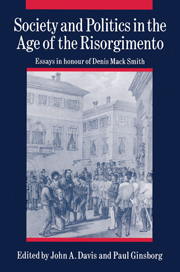Book contents
- Frontmatter
- Contents
- List of figures and maps
- List of contributors
- Preface
- Map 1 Italy in 1815
- Map 2 Italy in 1870
- Map 3 Italy – place names
- 1 1799: the Santafede and the crisis of the ancien régime in southern Italy
- 2 War and society in Napoleonic Italy: the armies of the Kingdom of Italy at home and abroad
- 3 The poor and how to relieve them: the Restoration debate on poverty in Italy and Europe
- 4 Bandits, violence and the organization of power in Sicily in the early nineteenth century
- 5 Marriage and the family in Italy in the early nineteenth century
- 6 After the Revolution: bandits on the plains of the Po 1848–54
- 7 Labouring women in northern and central Italy in the nineteenth century
- 8 Garibaldi in England: the politics of Italian enthusiasm
- 9 The middle classes in Liberal Italy
- 10 Francesco De Sanctis: the politics of a literary critic
- Bibliography of Denis Mack Smith's writings on nineteenth-century Italy
- Index
4 - Bandits, violence and the organization of power in Sicily in the early nineteenth century
Published online by Cambridge University Press: 30 January 2010
- Frontmatter
- Contents
- List of figures and maps
- List of contributors
- Preface
- Map 1 Italy in 1815
- Map 2 Italy in 1870
- Map 3 Italy – place names
- 1 1799: the Santafede and the crisis of the ancien régime in southern Italy
- 2 War and society in Napoleonic Italy: the armies of the Kingdom of Italy at home and abroad
- 3 The poor and how to relieve them: the Restoration debate on poverty in Italy and Europe
- 4 Bandits, violence and the organization of power in Sicily in the early nineteenth century
- 5 Marriage and the family in Italy in the early nineteenth century
- 6 After the Revolution: bandits on the plains of the Po 1848–54
- 7 Labouring women in northern and central Italy in the nineteenth century
- 8 Garibaldi in England: the politics of Italian enthusiasm
- 9 The middle classes in Liberal Italy
- 10 Francesco De Sanctis: the politics of a literary critic
- Bibliography of Denis Mack Smith's writings on nineteenth-century Italy
- Index
Summary
It has often been argued that both in Sicily and in Europe more generally banditry grew out of the rural overpopulation and poverty that were caused by the economic and social changes that accompanied the transition from feudalism to capitalism. Brigandage was as much a product of this process as rural vagrancy, the only difference being that the bandit was the more enterprising and the more prepared to use illegal means to stay alive. Hence poverty and deprivation are seen as the root causes of almost all forms of deviant behaviour, ranging from banditry, prostitution, and vagrancy to very different phenomena like the abandonment of illegitimate children as foundlings.
There are similar assumptions behind the argument that banditry was a form of pre-political protest in peasant societies which became especially prominent in moments of subsistence crisis or in response to the ‘fear of famine’. It was then that the bandit became the armed avenger of the peasantry, and by robbing merchants, money-lenders, taxmen, and wealthy landowners he symbolically brought about a juster distribution of resources. These actions gave expression to an embryonic class consciousness, albeit one that lacked political form or objectives since the bandit's response was an instinctive reaction born of centuries of exploitation.
The more extreme versions of this thesis developed in the years following the cultural revolution in China and the armed struggle for national liberation in Latin America, Africa, and South-East Asia in the 1960s.
- Type
- Chapter
- Information
- Society and Politics in the Age of the RisorgimentoEssays in Honour of Denis Mack Smith, pp. 70 - 91Publisher: Cambridge University PressPrint publication year: 1991
- 23
- Cited by



